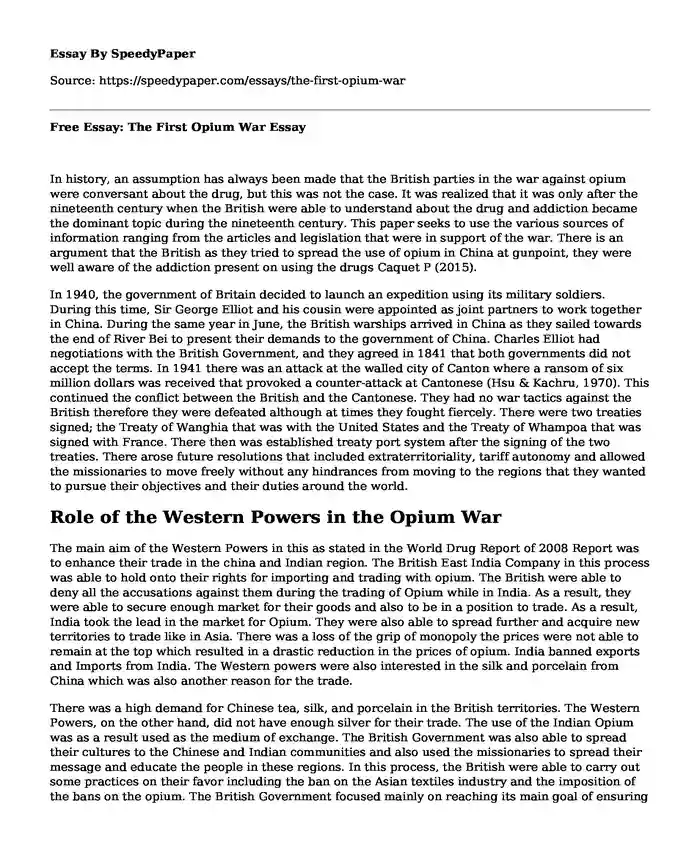In history, an assumption has always been made that the British parties in the war against opium were conversant about the drug, but this was not the case. It was realized that it was only after the nineteenth century when the British were able to understand about the drug and addiction became the dominant topic during the nineteenth century. This paper seeks to use the various sources of information ranging from the articles and legislation that were in support of the war. There is an argument that the British as they tried to spread the use of opium in China at gunpoint, they were well aware of the addiction present on using the drugs Caquet P (2015).
In 1940, the government of Britain decided to launch an expedition using its military soldiers. During this time, Sir George Elliot and his cousin were appointed as joint partners to work together in China. During the same year in June, the British warships arrived in China as they sailed towards the end of River Bei to present their demands to the government of China. Charles Elliot had negotiations with the British Government, and they agreed in 1841 that both governments did not accept the terms. In 1941 there was an attack at the walled city of Canton where a ransom of six million dollars was received that provoked a counter-attack at Cantonese (Hsu & Kachru, 1970). This continued the conflict between the British and the Cantonese. They had no war tactics against the British therefore they were defeated although at times they fought fiercely. There were two treaties signed; the Treaty of Wanghia that was with the United States and the Treaty of Whampoa that was signed with France. There then was established treaty port system after the signing of the two treaties. There arose future resolutions that included extraterritoriality, tariff autonomy and allowed the missionaries to move freely without any hindrances from moving to the regions that they wanted to pursue their objectives and their duties around the world.
Role of the Western Powers in the Opium War
The main aim of the Western Powers in this as stated in the World Drug Report of 2008 Report was to enhance their trade in the china and Indian region. The British East India Company in this process was able to hold onto their rights for importing and trading with opium. The British were able to deny all the accusations against them during the trading of Opium while in India. As a result, they were able to secure enough market for their goods and also to be in a position to trade. As a result, India took the lead in the market for Opium. They were also able to spread further and acquire new territories to trade like in Asia. There was a loss of the grip of monopoly the prices were not able to remain at the top which resulted in a drastic reduction in the prices of opium. India banned exports and Imports from India. The Western powers were also interested in the silk and porcelain from China which was also another reason for the trade.
There was a high demand for Chinese tea, silk, and porcelain in the British territories. The Western Powers, on the other hand, did not have enough silver for their trade. The use of the Indian Opium was as a result used as the medium of exchange. The British Government was also able to spread their cultures to the Chinese and Indian communities and also used the missionaries to spread their message and educate the people in these regions. In this process, the British were able to carry out some practices on their favor including the ban on the Asian textiles industry and the imposition of the bans on the opium. The British Government focused mainly on reaching its main goal of ensuring that they had a ready market for their products and that they also acquired enough raw materials for their companies back home. It was clear that their intention to trade was fulfilled by the trade in China He Tao, 2012.
References
Caquet. P., 2015.Notions of Addiction in the Time of the First Opium War. Retrieved on 17th January 2019 from https://www.cambridge.org/core/journals/historicajournal/article/notions-of-addiction-in-the-time-of-the-first-opium-war/A6D45CFB75A811B464E14CC525FB76AB
Hsu, I. C. Y., & Kachru, B. B. (1970). The rise of modern China (pp. 581-602). New York, NY: Oxford University Press.
China- "The first Opium War and its aftermath" accessed on 17th January 2019 from https://www.britannica.com/place/China/The-first-Opium-War-and-its-aftermath#
The World Drug Report, 2008. Retrieved on 17th January 2019 from https://www.unodc.org/documents/wdr/WDR_2008/WDR2008_100years_drug_control_origins.pdf
He Tao, 2012. A legacy of Commerce, Addiction and Gunboat Diplomacy. Retrieved on 17th January 2019 from http://blogs.bu.edu/guidedhistory/moderneurope/tao-he/
Cite this page
Free Essay: The First Opium War. (2022, Nov 11). Retrieved from https://speedypaper.net/essays/the-first-opium-war
Request Removal
If you are the original author of this essay and no longer wish to have it published on the SpeedyPaper website, please click below to request its removal:
- The Humanities Are Not a Luxury - Free Essay with an Article Analysis
- Free Essay with the Latest Trends in the Development of E-Commerce
- Innovation and Risk Management - Essay Example
- Free Essay on Public Health: The Anthem Policy
- Free Essay Sample: Market Research in Nike
- Essay Sample: The First Year of Obama in the Office
- Free Essay on Causes and Consequences of Rising Cost of Public Education in the United States
Popular categories





